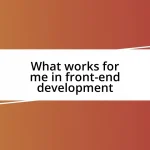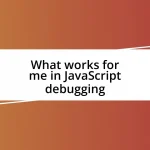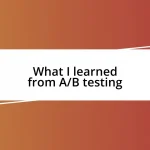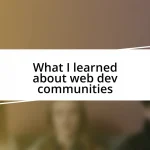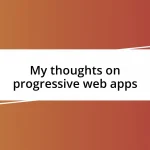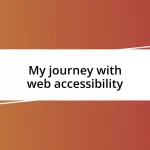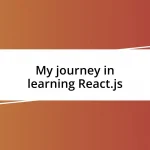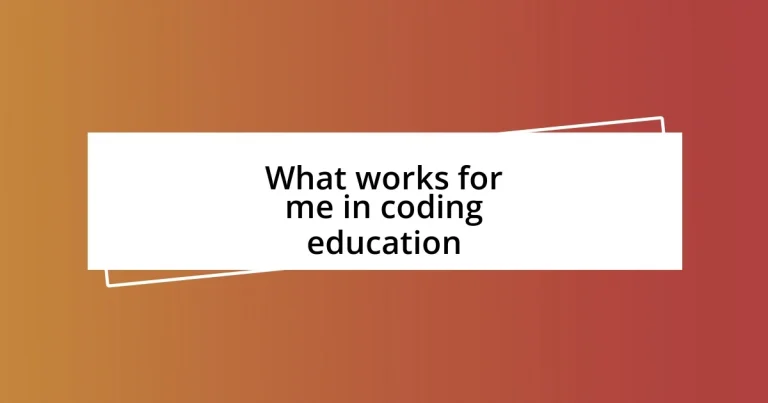Key takeaways:
- Experiencing small victories in coding, despite challenges, fosters resilience and passion for learning.
- Collaborative learning and mentorship provide diverse insights, enhancing problem-solving and skill development.
- Practical projects and continuous adaptation to new technologies solidify understanding and keep skills relevant.
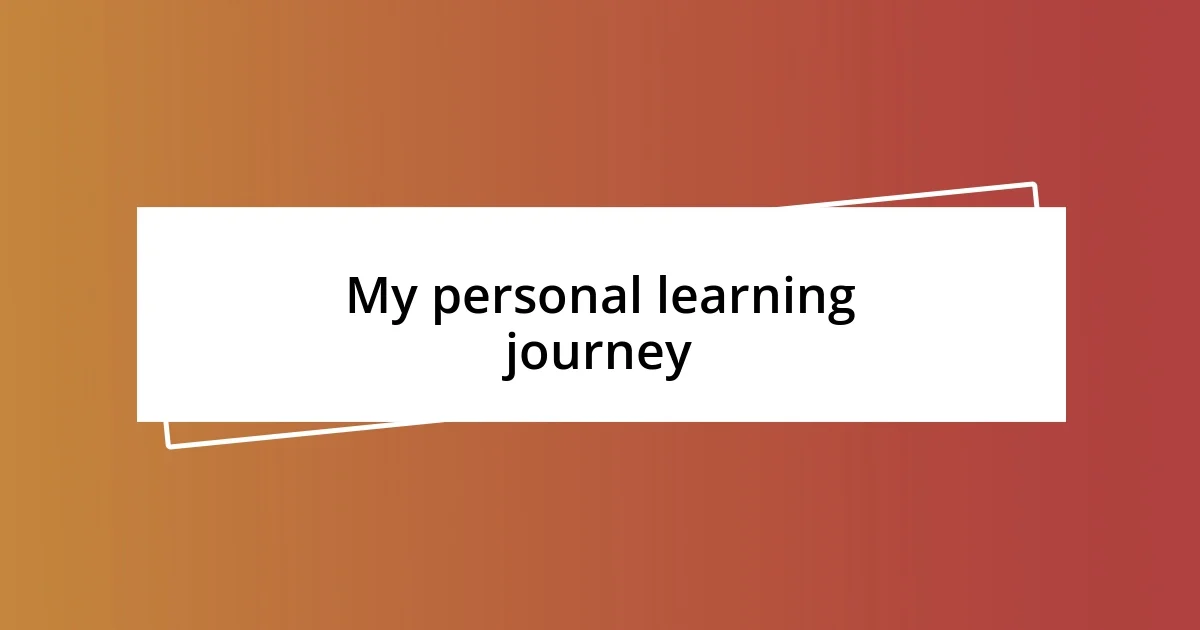
My personal learning journey
I still remember the moment when I first tried to write a simple program. My hands were shaking with excitement and a bit of fear. I wondered, “What if it doesn’t work?” But that moment of uncertainty transformed into pure joy when I saw my code run successfully. It’s these little victories that fueled my passion for coding education.
Through the years, I encountered several roadblocks—times when I felt utterly lost and overwhelmed. I vividly recall spending hours in front of my screen, racking my brain over a frustrating bug. I remember asking myself, “Why am I doing this?” Those challenges, however, turned out to be pivotal. Each struggle taught me resilience and deepened my appreciation for problem-solving.
Reflecting on my journey, I realize that collaboration has been a game-changer for me. Early on, I joined a study group where we shared resources and solved problems together. Do you know how inspiring it is to brainstorm with others? Surrounded by motivated peers, I felt like I belonged to a community that empowered each other. It’s incredible to see how collective learning can amplify individual growth.
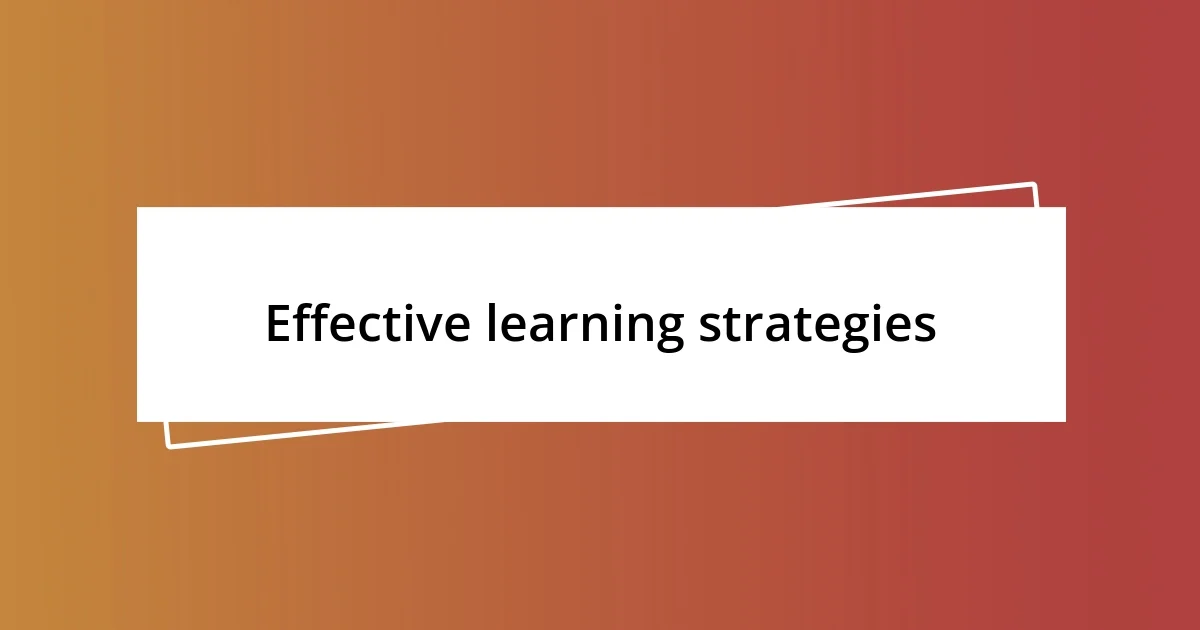
Effective learning strategies
Effective learning strategies can make a significant difference in mastering coding concepts. For me, one of the most impactful approaches has been breaking down complex problems into manageable parts. I remember grappling with a particularly challenging algorithm; instead of tackling it all at once, I dissected it into smaller functions. This made the process less intimidating and allowed me to focus on solving one piece at a time.
- Practice Regularly: Consistency is key. I found that coding daily, even for just 30 minutes, solidified my understanding and kept my skills sharp.
- Implement Real-World Projects: Working on projects that interest me not only engages my creativity but also helps to see practical applications of what I learn.
- Use Online Resources Wisely: I often dive into forums, video tutorials, and coding challenges, allowing me to learn from various perspectives and approaches.
- Seek Feedback: Sharing my code with peers or mentors has been instrumental. Their insights often highlight blind spots I hadn’t considered, pushing me to improve.
- Diversify Learning Materials: Switching between books, online courses, and hands-on projects has further enriched my understanding by providing multiple angles on the same concept.
Each of these strategies has been a stepping stone in my coding education, emphasizing that there isn’t a one-size-fits-all approach. Engaging with different methods has made my learning experience not only effective but genuinely enjoyable.
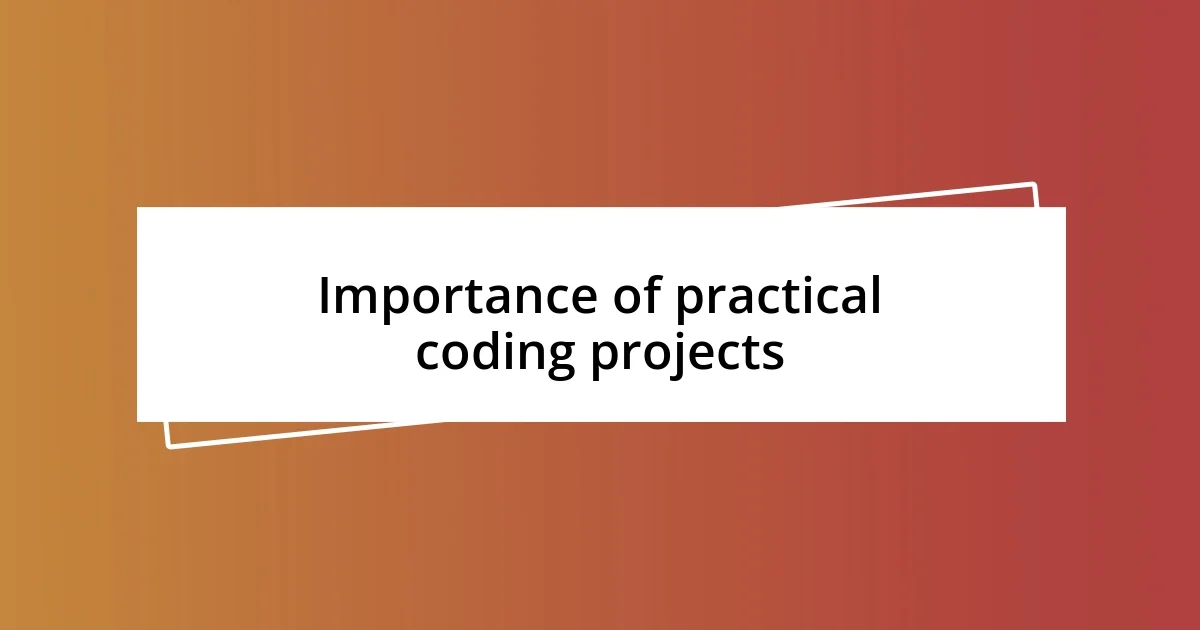
Importance of practical coding projects
Practical coding projects have been a cornerstone of my learning process. I remember the thrill of creating my first web application from scratch. It wasn’t a complex project, just a simple to-do list app, but seeing my code come to life was exhilarating. Every line of code felt like a brushstroke in a masterpiece, reminding me that theory is one thing, but putting knowledge into practice truly cements my understanding.
When I think back on those projects, I realize they did more than just teach me syntax and structure. They forced me to think critically and creatively about problem-solving. It’s a fascinating process—each project is like a puzzle, challenging me to break down issues and find solutions. For example, while working on a small game, I had to figure out how to implement collision detection. I spent hours debugging and testing until it finally worked. That moment of success was not just a triumph over a coding challenge; it was a reinforcement of my skills and a reminder of why I love coding.
To put it simply, practical coding projects are invaluable. They allow me to explore concepts in a hands-on way, and they also provide a sense of accomplishment. There’s something deeply rewarding about creating something functional out of lines of code. It’s a motivating force that keeps me passionate, invested, and always eager to learn more.
| Aspect | Impact of Practical Projects |
|---|---|
| Skill Development | Enhances critical thinking and technical skills through real-world applications. |
| Engagement | Increases motivation and interest by working on tangible products that solve real problems. |
| Confidence | Builds self-assurance as I overcome challenges and complete projects successfully. |
| Community Interaction | Encourages collaboration, feedback, and sharing of ideas with other learners. |
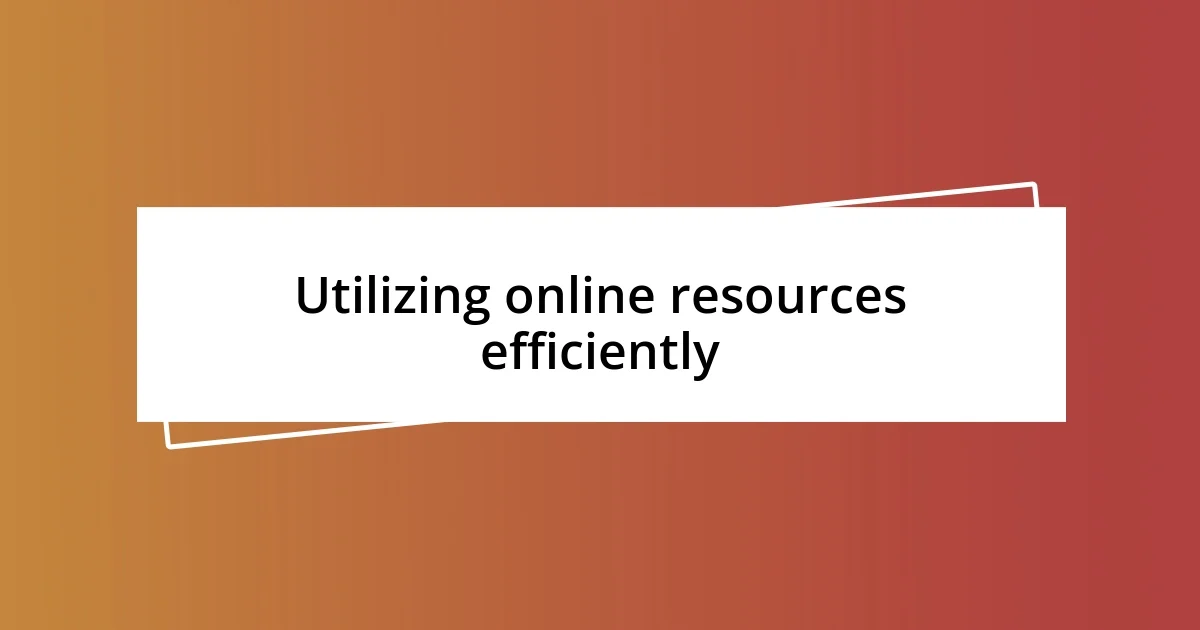
Utilizing online resources efficiently
Utilizing online resources efficiently has transformed how I approach coding education. I recall a time when I felt overwhelmed by the sheer number of online courses available. To streamline my learning, I began focusing on a few high-quality platforms that offered structured paths. By prioritizing fewer resources, I was able to gain a deeper understanding without getting lost in the noise. Have you ever felt that same paralysis by analysis when faced with too many options?
Additionally, I’ve found forums to be invaluable. Engaging with communities such as Stack Overflow has not only answered my coding questions but also exposed me to diverse problem-solving techniques. I remember posting about an issue I faced with a JavaScript function. The responses I received opened my eyes to methods I hadn’t considered before, enriching my knowledge and expanding my toolkit. It’s fascinating how sharing and discussing ideas can elevate our understanding, isn’t it?
Finally, I try to balance video tutorials with hands-on practice. There was a phase when I binge-watched numerous coding tutorials, feeling productive but not truly learning. It wasn’t until I paired those videos with real coding exercises that I noticed real progress. That “aha!” moment when I could apply what I learned was profoundly satisfying. How do you bridge the gap between learning and application in your coding journey?
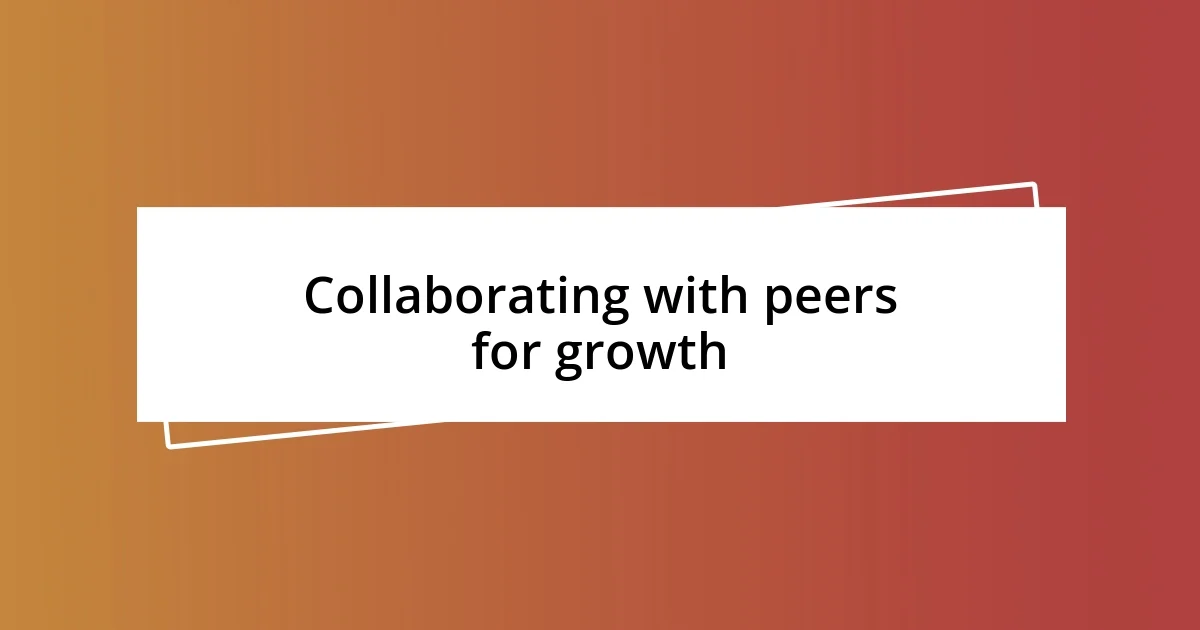
Collaborating with peers for growth
Engaging with peers in coding has been incredibly beneficial for my growth as a developer. I vividly remember a study group I joined during my early learning days. We would meet weekly to tackle complex coding problems together. There’s something magical about bouncing ideas off one another—when I faced a particularly tough bug, I still recall how someone else’s fresh perspective helped me see the solution clearly. Have you ever found that a simple conversation can ignite a breakthrough?
In collaborative environments, I often discover techniques I would never have encountered on my own. I once participated in a group project where we built a small web application. Each member had a unique skill set, and through the process of discussing our approaches, I picked up new frameworks and coding practices that broadened my understanding. It’s striking how teamwork can expose us to diverse methodologies that ultimately enrich our abilities. Isn’t collaboration a powerful teacher in itself?
Moreover, the feedback I received from peers has been vital in refining my skills. After presenting my code to a group, hearing constructive criticism stung at first, but it was incredibly valuable. I remember a peer pointed out some inefficient logic in my code, and while it felt uncomfortable to hear, it pushed me to reflect on alternative approaches. Embracing feedback—especially from those who share your passion—creates a culture of growth that fosters confidence and capability. Have you experienced that transformative power of peer input in your learning journey?

Seeking mentorship for guidance
Seeking mentorship has played a pivotal role in my coding education. Early on, I found myself struggling with complex algorithms until I sought guidance from a more experienced developer. I remember sitting down with my mentor over coffee, where they patiently walked me through concepts that had previously felt like insurmountable mountains. Have you ever had someone help illuminate a path for you when everything seemed daunting?
In another instance, I reached out to a mentor during a particularly frustrating project phase. As I explained my issues, their calming presence made a world of difference. They not only provided practical advice but also reassured me that struggling is a normal part of the learning journey. That simple validation helped me regain my confidence and see my challenges in a new light. Isn’t it amazing how mentorship can transform not just skills but also mindset?
I also appreciate that mentorship is a two-way street. While I gained invaluable knowledge from my mentors, sharing my enthusiasm for coding often ignited their passion anew. I once worked with a mentor on a side project, and our collaborative spirit led to innovative solutions. It’s exhilarating to think about how such relationships enrich both sides, don’t you think?
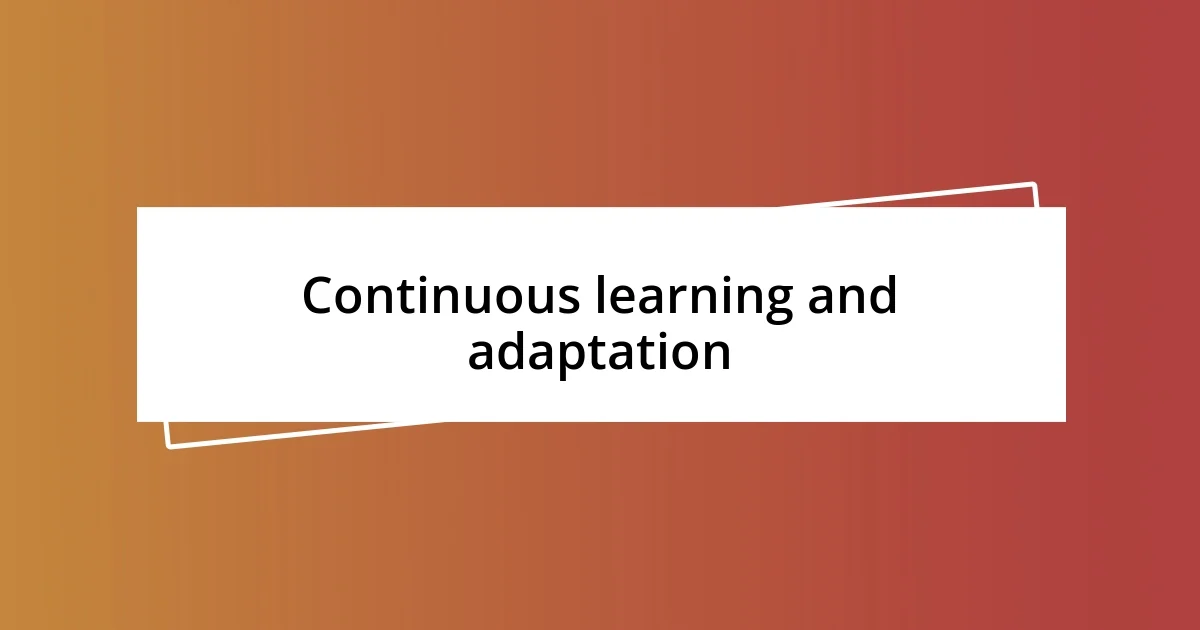
Continuous learning and adaptation
Continuous learning and adaptation are essential in the fast-paced world of coding. I often remind myself that technology evolves daily; staying stagnant is simply not an option. I experienced this firsthand while learning a new programming language. As I dived into syntax and structure, I quickly realized that the way I approached problems had to shift. Instead of just relying on previous knowledge, I needed to adapt my strategies to fit this new environment. Have you ever felt the need to recalibrate your mindset to tackle fresh challenges?
One of the most impactful moments in my learning journey happened during a workshop on emerging technologies. It was eye-opening to see how updating my skills made me more confident in tackling real-world problems. I recall one exercise where we used a new tool for version control. Initially, I was hesitant about the change, but once I saw how it simplified our workflow, I was all in! Embracing these learning opportunities can be intimidating, but they’re also incredibly rewarding. How do you feel when you step outside your comfort zone to learn something new?
In my experience, the key to continuous learning is not just acquiring new knowledge but also applying it. After taking an online course, I made it a point to implement the concepts I learned in my personal projects. I remember incorporating best practices from the course into my code revisions, and the difference was significant—it felt like I was finally moving from theory to practice. This iterative process of learning and adapting keeps my skills sharp and relevant. Have you noticed how putting new knowledge into action can reinforce your learning experience?

